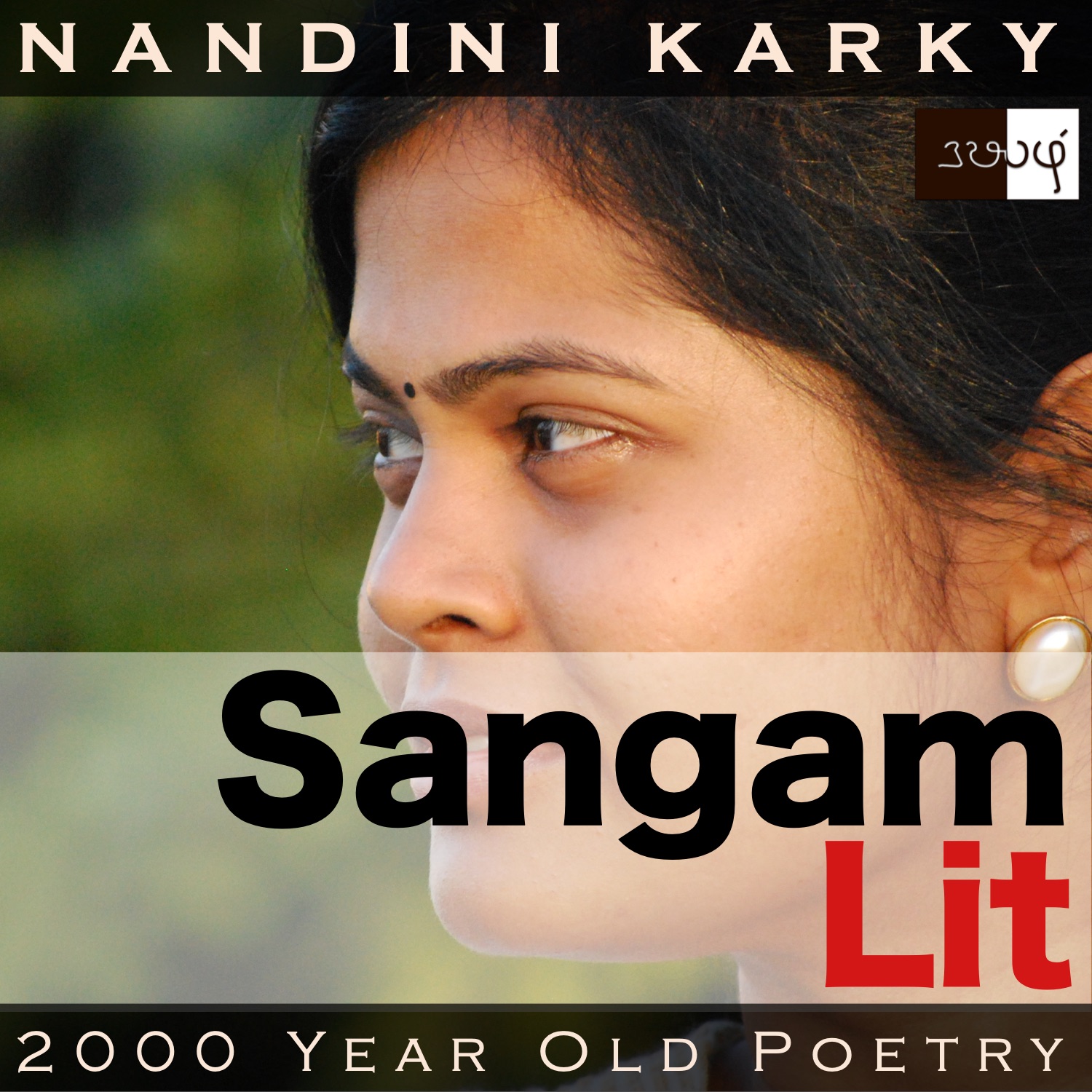Podcast: Play in new window | Download
Subscribe: Apple Podcasts | Spotify | Amazon Music | Android | iHeartRadio | TuneIn | RSS | More

In this episode, we relish the life and love depicted in Sangam Literary work, Natrinai 81, written by Akamban Maalaathanaar, this being his only Sangam poem. The poem is set in the ‘Mullai’ landscape or the forest regions and revolves around the theme of patient waiting. Speaking in the voice of the man to his charioteer, the verse expresses the man’s wish to rush home at the end of his task, so that he could bask in his lady’s smile.
இரு நிலம் குறையக் கொட்டிப்பரிந்தின்று
ஆதி போகிய அசைவு இல் நோன் தாள்,
மன்னர் மதிக்கும் மாண் வினைப் புரவி
கொய்ம் மயிர் எருத்தில் பெய்ம் மணி ஆர்ப்ப,
பூண்கதில்-பாக!-நின் தேரே: பூண் தாழ்
ஆக வன முலைக் கரைவலம் தெறிப்ப
அழுதனள் உறையும் அம் மா அரிவை
விருந்து அயர் விருப்பொடு வருந்தினள் அசைஇய
முறுவல் இன் நகை காண்கம்!-
உறு பகை தணித்தனன், உரவு வாள் வேந்தே.
The very first word of the verse was illuminating for the word ‘இரு’ revealed a new meaning for itself, which is ‘vast’. Also discovered that the word ‘ஆதி’ usually used to denote ‘beginning’ appears here in the meaning of ‘traversing in a straight line’, with regard to a movement of the horse, ‘புரவி’. ‘மா அரிவை’ puts the spotlight on the skin colour of a Sangam girl meaning ‘dark skinned’ and is an epithet for her beauty. In the last scene, we meet the words ‘பகை தணித்தனன்’ meaning ‘he subdued his enemies’ and ‘உரவு வாள் வேந்தே’ meaning ‘the king with a mighty sword.’ What’s the link between these scenes of war and his words full of love? Let’s trot with that horse to the centre of the verse.
The man was living a happy wedded life with his lady. Once, he had to leave to complete a task and having finished that, he turns to his charioteer and says, “Making vast lands shrink, that strong-legged, tireless horse trots in a straight line. A horse that does great things and is respected by kings. Tie that horse to the yoke of your chariot and making the bells tied on its throat, around its trimmed mane jingle, make haste, O charioteer! My dark-skinned lady stands there back home, waiting with tears splashing on her bejewelled bosom. When she sees us returning, she will desire to spread a feast for us and her sad face will break into a smile. Let us see that smile soon! Now that our mighty, sword-wielding king has subdued his enemies, our work is done and near her smiling face, is where I should be!” With these words, the man makes us understand he is returning from a war, after aiding the king, and that his thoughts have turned homeward to his waiting lady.
Now, it’s time to take a closer look at this trotting verse. We have seen in many poems before, a man leaving his lady, to go in search of wealth. But, here is a case where the man leaves to aid a king in his battle. The poem is different because there are no descriptions of the natural scene and we glimpse at no trees and no flowers! Perhaps, that sets the unsentimental mood of a battle in the background. The initial portion of the verse reads like a brochure for a battle-worthy horse! The man elaborates the greatness of the horse in minute detail. He talks about its power to shrink great distances and how it’s capable of great feats and is respected by the rulers of the land. He talks about the way it moves, with great focus, undistracted in a straight line and calls it, a tireless being. To me, this looks like the Sangam equivalent of a flashy, full-page ad for a sleek, new car! Perhaps he does this because he feels grateful to the horse that helped him complete his task to his satisfaction or maybe he wants to cheer his charioteer, talking about the glorious animal he rides. Whatever be his reasons, we see the man open his statement with this glowing praise of the horse that will take him home to his waiting wife. The man then paints a portrait of his lady, standing there, with tears falling down, because she has no news of her man. Then, rushing forward in time to that future moment when the lady sees the man and his group returning, he is able to picture her tear-streaked face, breaking into a little smile, at the thought of her cooking a feast for them. With one stroke, the man completes the portrait of his lady as one with a loving heart that yearns for him and at the same time, her thoughtfulness and hospitality in wanting to serve a feast to the famished warriors!
The man clearly demonstrates that in the end, joy is not about the kings you help or the battles you win. Even in that glorious moment of being in support of a mighty ruler, helping him win a war, it’s not pride that sits in his heart. What tugs his heart is that face, yearning for his arrival. Across eons, we hear the whisper that whatever your battles, your weapons, your victories, be it then or now, home and love is the only thing that matters in the end!




Share your thoughts...